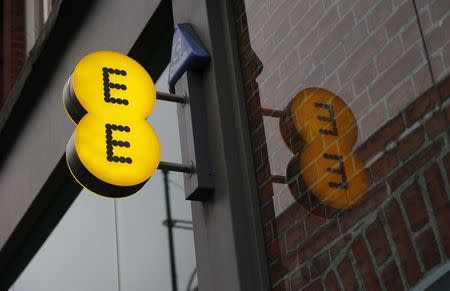On mobile, BT to make the call on bigger EE or easier O2 deal
By Kate Holton, Leila Abboud and Anjuli Davies
LONDON/PARIS (Reuters) - BT Group's choice between buying Britain's number one or two mobile operator will come down to whether the broadband leader wants to stretch to buy EE, a higher quality, larger company, or take the lower risk, simpler option presented by 02.
The 168-year-old national fixed-line network operator has been in talks with Telefonica's 02 and separately with EE, which is owned by Orange and Deutsche Telekom, for nearly two weeks, people familiar with the situation said.
Analysts value EE at 11 billion pounds, and 02 at 9.4 billion pounds.
At issue is not only the price the seller would accept but also the structure, with regard to cash or shares or even asset swaps, and whether BT would undertake a rights issue, banking and sector sources said.
Although credit rating agencies say BT can borrow up to 10 billion pounds without hurting its ratings, the firm needs to have the financial firepower to bid against pay-TV leader Sky in next year's auction of TV rights to show English Premier League football matches.
The manoeuvring comes as the UK telecoms markets undergoes a shift towards "multi-play" offers of fixed and mobile broadband, home phone and pay-TV services and has galvanised mobile rivals such as Vodafone and Hutchison Whampoa's Three into actively looking for deals or partnerships.
As market leader for mobile services, with 24.5 million subscribers, EE is a growing business which got a headstart in offering 4G mobile broadband. However, a sale could be complicated by the need to negotiate with its joint owners who don't always see eye to eye.
O2 is in second place in the market with 22 million subscribers and owns less than half the radio spectrum of EE, but could be cheaper to buy since it is smaller than EE and parent Telefonica is eager to bring in cash to pay down debt.
"BT is in a sweet spot," said one banker, who asked not to be named. "Neither Telefonica nor EE are in a great position. They can compete on price but that means it is only going one way -- down."
Rivals had been increasingly concerned this year by evidence of BT pressing ahead on building its own hybrid, low-cost mobile network for launch next year so it has a full "quad-play" of services on offer, prompting the approaches by O2 and EE, according to banking sources.
The operator that misses out on the BT deal could look to work more closely with another operator, such as Three, or a fixed-line provider.
PROS AND CONS
BT's choice between EE and 02 is seen as similar to a prospective homebuyer trying to decide between buying a bigger house that is ready for moving into and a slightly smaller, cheaper house that needs some work.
One sector banker said EE was the better business. "The cost synergies are much higher. Only thing is, it's harder to do a deal with France and Germany, two national incumbents, so (it) could be trickier to execute."
EE, which holds about 33.8 percent of the market in terms of mobile service revenue, has a superior network and 115 megahertz of spectrum compared to 02's 48 MHz and BT's 35 MHz. Its super-fast 4G network covers 75 percent of the population and has attracted 5.6 million customers in the two years since launch.
But EE's history has been problematic as a joint venture which merged the Orange UK and T-Mobile networks in 2010 and has rebranded twice since, with the integration still to be completed.
In comparison 02, which is neck and neck with Vodafone with 26.2 percent of the market in terms of mobile service revenues, has adequate spectrum, national coverage, and strong brand positioning among corporate customers. Since the 02 network originated with BT, having been floated on the stock market in 2001, it could be a better fit.
"On paper maybe EE is a slightly better asset, but O2 is very good, and has a solid customer base," said the sector banker, who sees more value in 02. "Both would work well for BT, and there is not a major difference in terms of synergies."
Cash is also a factor in doing a deal, with BT needing to be seen to have the financial firepower in next year's Premier League football rights.
However, one of BT's biggest shareholders told Reuters that he would support the purchase of a mobile operator even if it meant a rights issue. "It feels lower risk and evidently more financially attractive from day one," he said.
Telefonica has pitched a scenario where it would get a stake of around 20 percent in BT, worth some 8 billion euros, and some additional cash, sources close to the company said. It is unclear if Orange and Deutsche would consider anything similar.
But Bruno Grandsard, a portfolio manager at Axa Investment Management, said BT had only winning cards to play.
"If I were in BT's shoes, I would look at buying the cheapest of the two assets and then work to improve its performance."
(Story refiles to correct typographical error, adds missing crosshead)
(Additional reporting by Paul Sandle, Pamela Barbaglia and Harro Ten Wolde; Editing by Greg Mahlich)




